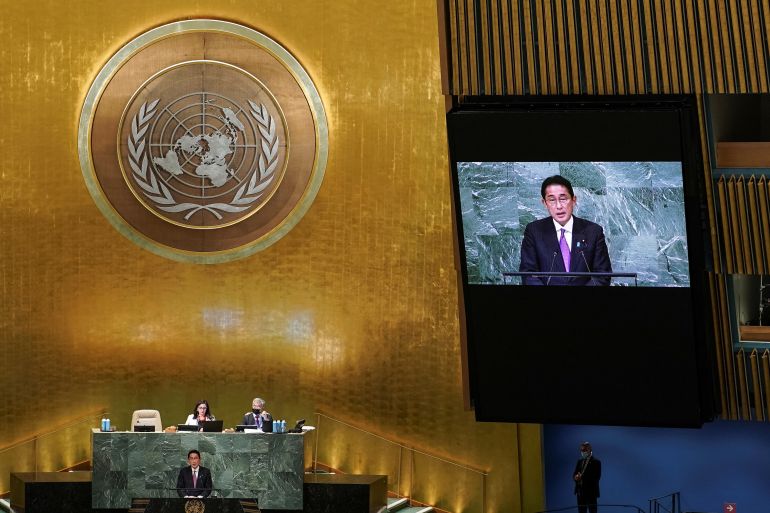Russia’s invasion of Ukraine ‘tramples’ UN charter: Japan PM
Fumio Kishida steps up calls for reform of UN system after failure of Security Council to respond to Russian attack.

Japanese Prime Minister Fumio Kishida has voiced disappointment over the failure of the United Nations Security Council to respond to Russia’s invasion of Ukraine, calling for reforms that would allow the UN to better defend global peace and order.
“Russia’s invasion of Ukraine is a conduct that tramples the philosophy and principles of the UN charter … It should never be tolerated,” Kishida told the United Nations General Assembly (UNGA) at its annual meeting in New York City, calling for reform of a system that gives five states, including Russia, a veto in the Security Council.
Keep reading
list of 4 itemsUN chief calls for energy windfall taxes to help climate victims
Iran’s Raisi meets European leaders at UN amid nuclear deadlock
UN General Assembly: Who is attending, and what’s on the agenda?
“We must face the reality that the integrity of the United Nations is at risk because of the invasion of Ukraine by Russia, which is a UN Security Council member,” Kishida said in his speech to the 77th UNGA. Reforms have been discussed for nearly 30 years, he said. “What we need is action toward reforms, not just talk.”
Japan has long sought to reform the UN Security Council, saying it was designed by the victors of World War II and does not reflect the reality of international society, and since 2004 has promoted a reform plan with Germany, India and Brazil. Japan will have a seat as one of the Security Council’s non-permanent members beginning in January.
Kishida, who comes from Hiroshima, the first city to ever suffer an atomic bombing, also expressed disappointment over the failure of negotiators last month to reach an agreement on the UN’s Nuclear Nonproliferation Treaty — considered the cornerstone of nuclear disarmament — after Moscow blocked the final draft.
He also condemned the threat of nuclear weapons by Russia.
Russia invaded Ukraine on February 24, and Russian President Vladimir Putin obliquely raised the possibility of a nuclear strike shortly afterwards.
Last month, a Russian diplomat said at the UN that the conflict in Ukraine did not warrant Russia’s use of nuclear weapons, but Moscow could decide to use its nuclear arsenal in response to “direct aggression” by NATO countries over the invasion.
“The threat of nuclear weapons, like what Russia did this time, let alone the use of them, are serious threats to peace and safety of the international community, and are never acceptable,” Kishida said.
On Tuesday, Moscow-appointed officials in occupied areas of eastern Ukraine announced plans to hold referendums on whether to join Russia.
Dmitry Medvedev, the former Russian president who is now deputy chairman of the Russian Security Council, said the votes would allow the Kremlin more options for defence of what he said would become Russian territory.
“Encroachment onto Russian territory is a crime which allows you to use all the forces of self-defence,” Medvedev said in a post on Telegram.
Russia’s nuclear doctrine allows the use of such weapons if weapons of mass destruction are used against it or if the Russian state faces an existential threat from conventional weapons.